
Mrs. Zanneta Kalyva-Papaioannou was born in Larissa. Her parents were from Vachlia, an Arcadian village, Greece. She studied in the Supreme Industrial School of Piraeus (with scholarship) and simultaneously, she was working in the “Public Electric Power Company.”
She is a journalist, poetess and author. Her work has been published in international and panhellenic newpapers and magazines. Her poems, there are in Anthologies and have been translated in English, French, Italian, Chinese, Albanian and Korean.
Her writing has won international and panhellenic prizes. She is a member of the “World Congress of Poets/World Academy of Arts and Culture” and “The International Poetry Translation and Research Center” (which awarded her the title of Doctor of Literature”, of the Accademia Ferdinandea,” and “Magistero Siciliano di Servizio Sociale” Italy, of the “International Writers and Poets Laureate International,” of the “International Society of Greek and Artists,” of the “Union of Greek Writers,” of the “Literary Club “XASTERON” of the Literary Club of Helioupolis: and many social Associations of Greece. She is referred to in the American “Who’s Who” and “I. B. of Cambridge” (UK).
She has published:
Websites:
Bio and poems on this page are reprinted from her wonderful, multi-lingual book, “With My Heart’s Wings.” For translations, see her pages in the sections for Greek, French, Italian and Chinese. The essay is not available in translation.
THE RHETORIC OF PHILIA AND STORGE IN THE POETIC COMMITMENT OF ZANNETA KALYVA – PAPAIOANNOU
By Dr. Shujaat Hussain
4/771, Friends Colony, Aligarh- 202 002.
Writing about Zanneta Kalyva is a delightful task for me. I am still studying Plato, Aristotle, Addition, Johnson, Richards, Dryden, Arnold, Coleridge, Moulton, Scherer, Warton, and Eliot etc. When I write I want to be true and honest critic. It’s my passion to ferret out Excellencies instead of Imperfections. I regard it my principal duty to discover the concealed beauties of a writer, communicate to the world such things as worth their observations.
Zanneta Kalyva – Papaioannou is an eminent poetess in the Greek poetry whose voice startles and attracts the attention of the contemporary people breaking barrier of the borders, religion, region and colour. She has a remarkable academic and professional career to her credit, is the author of many books, the latest one is with my heart’s wings (multi-lingual – Greek, English, French, Italian, and Chinese). It contains 25 poems, Zanneta’s feeling of her heart, a kind of feeling that blesses wing. The words of her poetry are simple, familiar, affectionate, fragrant and lofty which is like dose for the readers to take and invigorate themselves for the sake of human beings to please God. It will help in cultivating humanistic atmosphere for leading lives in calm and tranquility.
Zanneta is a Greek poetess and winner of numerous national and international accolades. Zanneta’s prophetic work will be considered seminal in the history of poetry because of its merits. Her creative vision engenders symbolically rich corpus and embraces imagination. She is highly regarded today for her expressiveness and creativity.
Wordsworth expressed in his own style the spirit of delight that he realized in nature. Shelley’s was a Platonic contemplation, accompanied by a spirit of revolt against every kind of obstacle, political, religious or otherwise. Keats’ poetry was wrought out of the meditation and creation of beauty and now Zanneta’s poetry has taken shape what she felt at the bottom of her heart i.e., love and passion. To find out love and passion we will have to know exactly what Eros, Philia, Agape, Storge and Thelema stand for. And Zanneta’s poems revolves round these loves.
Love represents a range of emotions and experiences related to the senses of affection and sexual attraction. The word love can refer to a variety of different feelings, states, and attitudes, ranging from generic pleasure to intense impersonal attraction. As far as studies of my Greek language are concerned I have observed that there are different Greek words for love, as the Greek language distinguishes how the word is used.
Eros is passionate love, with sensual desire and longing. The modern Greek word ‘erotas’ means ‘romantic love’. Eros does not have to be sexual in nature. Eros can be interpreted as a love for someone whom you love more than the philia love of friendship. It can also apply to dating relationships as well as marriage. Plato defines it ‘without physical attraction’.
Philia, which means friendship in modern Greek, virtuous love, loyalty to friends, family, and community and requires virtue, equality and familiarity. In ancient texts, philia denoted a general type of love, used for love between family, between friends, a desire or enjoyment of an activity, as well as between lovers.
Agape means ‘love’ in modern day Greek such as in the term s’agapo, which means “I love you”. In ancient Greek it often refers to a general affection rather than the attraction suggested by ‘eros’; agape is used in ancient texts to denote feelings for a good meal, one’s children, and the feelings for a spouse.
Storge means ‘affection’ in modern Greek; it is natural affection, like that felt by parents for offspring. Rarely used in ancient works, and then almost exclusively as a descriptor of relationships within the family.
Thelema means ‘desire’ in modern Greek; it is the desire to do something, to be occupied, to be in prominence.
She is blessed with a high fancy, a civil and sharp wit; and with a natural elegance, both in her admirable behaviour, her sweet tongue, and her powerful pen. With My Heart’s Wing reflects her great abilities, learning and virtue, her lots of affection.
The poems in With My Heart’s Wings are sequentially related, simple but startling, soul searching, pacifying, fecundity in art, literally moving and moulding. Zanneta’s stalwart eyes are wide open. The word heart plays an important role in purifying souls. Like saints and sages, Zanneta conveys message to the world. This is the essence which permeates from With My Heart’s Wings.
The very first poem of this book You came has been composed for the sake of granddaughter, Konstantina-Theodora and it happens that the book is dedicated to her. This is a marvelous in various ways-which runs like- a, Testament of our time. It has all the idealistic nuances. Zanneta invariably generalizes her theme that is the unique feature of her poetry which touches the mind and heart of the entire humanity under the sun.
She has been longing for a long time for granddaughter so when her son Giannis was blessed with a daughter her long agog was fulfilled, the following lines are self-explanatory:
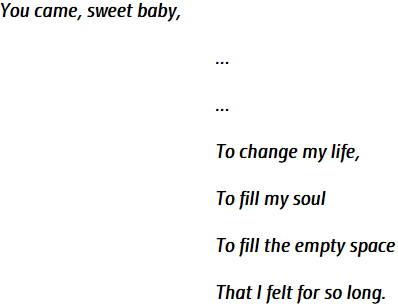
The same dream and aspiration continues in the next poem Lullaby.
The granddaughter to her is like ‘sweet pride’, ‘violet bird’, a vivid little angel’, ‘like moonlight’, and ‘light softly everything she touch’.
She does not only expresses love and longing; affection and affinity but also advise and aspire; inspire and instruct. Zanneta’s heritage is rich. She hopes that Konstantina will certainly carryout the scintillating glories of her family, community and of her land:
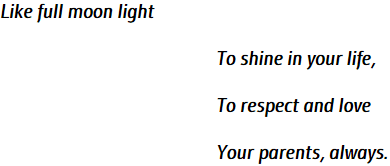
A woman has several stages in her lives such as daughter, wife, mother and grandmother etc. Among them the stage of being a mother is vital, grand, loving, caring, full of pains and pleasure, sincerity, sacrificial, and a period to carry lots of duties. Whatever the sons and daughters impart to their mother in lieu of her caring, sacrifice and pains is meager. Zanneta, too, knows well visualizes her worth and honour in the first stanza of the poem Blessed mother:
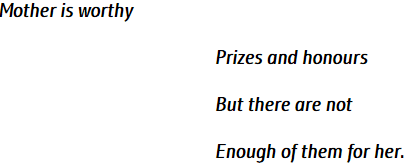
For mother when pain is most intense, it is utterly pleasurable. From dawn to dusk, all the time she cares, appears smiles on her face despite pains and ponders; she wishes and prays, ‘a better life wants for her family’ and ‘she has a comfort word for every pain and grief’.
Zanneta after experiencing all stages of a woman, she shows men dominated world that it is stages of women that hold the world:
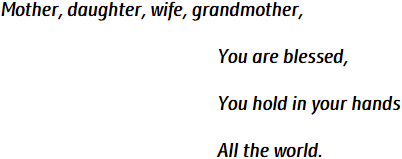
The poetess herself is the protagonist in the poem The grandmother. Every stanza begins with the word ‘here’ which symolises the yard or courtyard of her own house where she has hens and chickens for the granddaughter to play with and make merry. She keeps neat and cleans for her beloved one to come and narrate fairy tales… “A story, a story, a fairy tale, a fava bean and chicken pea…” She believes that feature of good grandmothers as under:
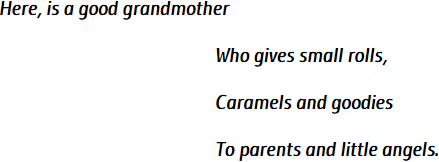
It deals with human life and feelings. Her poem is unrhymed versification and modified by a variety of schemes clipped, abrupt and forceful expressions.
Zanneta defines and elucidates advantages of smiles in her poem The smile. ‘Broad smile’ and ‘deep smile’ have its own significance and implications. If smile is from the bottom of the heart it creates affection and understanding. It makes them feel that the grandmothers have the heart. This is a precious gift to the children. They will have expectation in the glance and joy in their hearts. It has remarkable impact on the children:
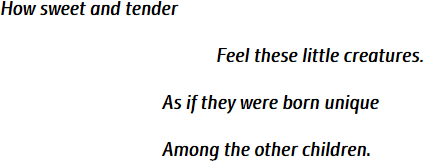
Everybody wishes for sons. They are sights for their parents. If aspiration is accomplished, one feels everything has got in one’s life. And if someone is not blessed with a son, a man consummates another marriage. Divorces take place. So many rituals are performed. Precious sacrifices are offered at places of worship and temples. Aspirants go on pilgrimage according to their beliefs. Unbridled quarrels become custom of the houses and spoils smooth going lives. In-laws take undue advantages of it and on being not producing son has to be faced by wives (daughter-in-laws). Sometimes it happens to be disastrous. So Zanneta feels pride and joy on being mother of a son:
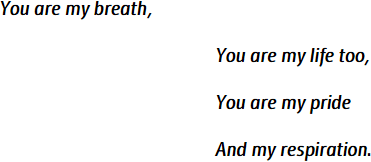
Readers may understand from the words that she uses in the poem To my son Giannis ‘my breath’, ‘my life’, ‘my pride’, and ‘my respiration’. She wishes her son Giannis and daughter-in-law Despina ‘many happy returns’ be happy and joyful.
During the life of a mother, if any misfortune occurs she has no regrets. The presence of the son heals up every wounds and bruises. Blessed with a son or deprived of him is not in one’s capacity but by far, the greatest miracle, she emphasizes by using in bold and dark great miracle in the poem:
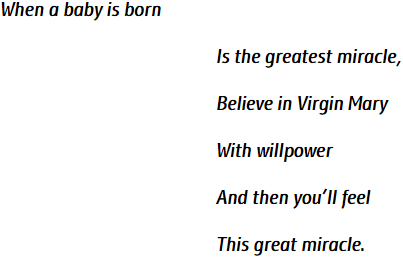
In the concluding stanza she applies adage through her chiseled words to convey predetermined message that was lying in her heart. She universalizes and compels to think and follow in the lives:
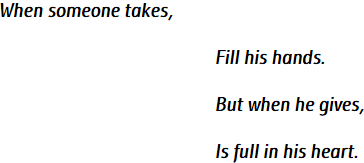
No one can fulfill the rights as much as she does for her sons or daughters. No children may be as much as dutiful as their mothers do for their children. From womb to adulthood she bears pains for the nourishment for their children is beyond human vision. Zanneta’s poem entitled To my mother opens eyes of those people who forget their mother after adulthood and getting married. ‘Mother’s milk’, ‘mother’s lap’, and ‘mother’s love’ are so precious those we cannot pay their prices.
Zanneta pays tribute to her mother at the time of demise. She used to walk around in spring but this time death has put its icy hand on her mother. She left her for eternal abode. Reminiscence moves before her eyes:
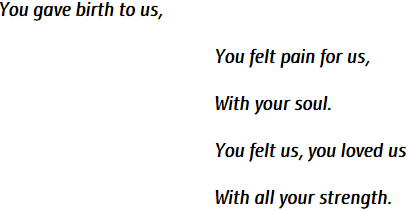
Zanneta’s mother’s progeny is proud of her because of her love, care, and affection. She walked in grace and won their hearts.
If the love is true it conjures two hearts. Trust is essence of love that activates men and women explore the treasure-trove hidden deep down, the life invigorates. When Adam pleased for company there, out of divine love God created Eve. Love and romance is as true as honeydew, heart beats sync to form a song of love; words are symbols of deep-rooted pine trees, lovebirds exchange eyes and pledge to be true.
The poetess has enjoyed and led romantic lives. She felt like a thunderbolt to strike with caresses and kisses. There are platonic, divine, love for lust, and for wealth. She liked to enjoy love for better life and ‘riches were not the purpose’. What sort of love she likes is found in the poem The romance:
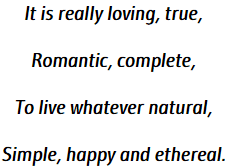
She describes beauties of the eyes and lips of her beloved in the poem Your beautiful eyes. It mesmerizes and bamboozles her. She expresses her taste and desire in the way that beautiful eyes have bewitched and rose colour lips have seduced her. When her beloved’s lips land on the lips and cheeks its impact is so sensuous that her mind ceases functioning. Her heart begins to sink when she stares at her eyes and when she kisses on the lips of her beloved she feels shivering on all over her body. She has very much experience of kisses on lips and she is fond of it with her beloved:
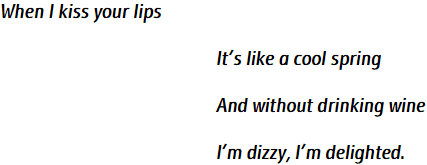
Nobody wants to forget days of delight, dance, music, joy, pomp, show, hug, kiss and caress. Zanneta also recollects in her poem It is beautiful to remember. She says that it is beautiful to remember all of memories and she compares the years that passed to like the snows. She has already stepped in the stage of third generation so definitely she would have vast experience of lives that is why she says exactly what life needs:
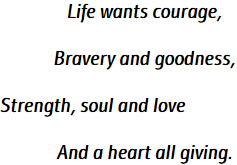
Whenever and wherever she speaks in her poem about love and life, it always amazes and be a magnet for the attention at once. Without love life is just like pale leaves, a tree without leaves, a moon without beauty and light, a sun without heat, a sea without waves, and a body without soul, the Everest without snow, a flower without fragrance, a pen without ink, and a woman without delicacy. She asserts that Life is so beautiful and it is made for love; take all this beauty and never think about fame and wealth.
The poetess is a true speaker. She speaks in Loneliness from the core of the heart. She does not conceal anything what she did with her beloved. She puts in ink on the piece of paper and makes her touch, warmth, feeling, dizziness, and ultimately she makes her mundane love eternal. She provides a picturesque view by describing one evening that she was walking alone on Paros’ island and her mind was seeking her beloved for love and a touch. She looked at the sea and found the face of her beloved and this glimpse shook her in the warm breath of the beloved. Her love consummates in the following lines:

What Jorge Luis Borges (Argentina), Bertolt Brecht (Germany), Denise Levertov, Edgar Lee Masters and William Stafford (All the three from USA), Wilfred Brown (Britain), Sankichi Toe (Japan) and Wislawa Szmborska (Poland- She was awarded the Nobel Prize in Literature in 1996) expressed in their respective poems Zanneta expresses in Passers – by. It seems that there was an urge in her to compose such kind of poem, without it, her commitment to poetry would have failed. Certainly it comes to my mind as to what were the questions or restlessness in her that compelled her to write this kind of poem?
Being superior in wealth, education, technology and civilization have made the United States of America superpower. By using power cultivating fear, exploitation and reaping their harvest with the blood of the innocent people. How can we remove blots from the pages of history? “Two souvenirs Nagasaki and Hiroshima of the Second World War that have withstood the time and the hate”, Says Audie L. Murphy. After September 11, 2001 Americans have dropped so many Daisy cutters and guided missiles in the countries like Afghanistan and Iraq that hills, rocks and mountains have turned into sand consequently tolls are uncounted and miseries untold. Palestinians are homeless and refugees in their own land. Innocent people are being tortured without cause. Such kind of inhuman activities would definitely have forced her to write Passers – by so that those who are involved could rectify their deeds. Philanthropist cannot sit idle thus her pen moved and cosmic creation came into existence.
This poem starts with We are passers – by in this world and let understand it. She tries to remove the perception that they are to rule over the world, it is just like a castle in the air. Those who have born will die. Her immortal sentence, as it appears from the scripture ‘let’s show the good ourselves with willing, desire and proud’. Just keep in the mind that we have been created with the purpose. Earth is not ours. Almighty, the Creator, from the seventh sky watching us where yours thought can’t fly. Her words, lines and stanzas are to remember and apply in own lives:
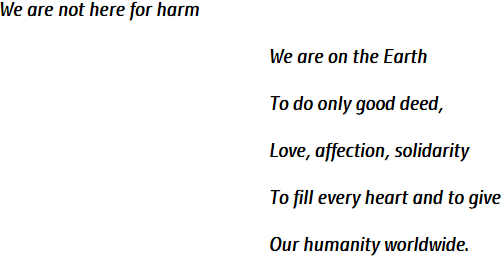
The way she shows is not easy to walk. It requires command, love and wisdom. However, we will find out that it is the sweetest sacrifice.
It is the nature, thinking and mentality of human beings who are called super beings that they are selective in having friends. And they are selective in extending their cooperation. We just take examples from our surroundings trees on the roadsides provides shades to everyone, flow of water for everybody to quench thirst, and fragrant flowers to smell all. Zanneta cites examples of the sun in her poem The friends to take lesson:
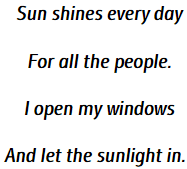
We will have to make the world friendly if we want to get pleasure and all of peace, and all our trouble to release. The prose of life takes the lilt of rhyme when we solemnize, A song to sing and crust to share; a road to walk and a goal to win; a vale to cross, a hill to climb since the world is made of friend.
She has unflinching faith in Almighty. Love’s lily is a perfect paradigm in the garden of her poetry. God has created all the things with wisdom and with love for everything on the earth. Her grand message is for the people irrespective of barriers of borders:
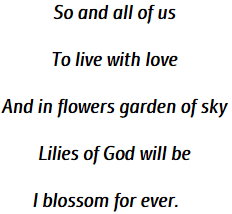
Every body has right to move free and enjoy oneself. There must not be any restriction of any kind which give an idea to be in a cage. We can find exhibition of freedom in the poem The peaceful bird.. The birds fly freely in the sky that makes them happy. Once it is flying down near the earth and other times it is flying in the clouds. It gives moral boost.
It moves and flies in accordance with their will, always flying in all the places of the earth and it never rest during night or in the midday. It takes message of freedom and peace everywhere:
The concluding poem of this book is Hellas – The torch of Olympic Games wherein she remembers the marvelous beauty glorious history of her country. It’s enviable for others. There are thousands of songs in praise of her country that move the heart and soothe the mind. Comely seashores and blue seawaters are its ornaments. Greece is peerless in beauty and illustrious history. There is a significance of Olympic Games. It is spirit that keeps the world united:

Her verse is marked by virility of thought, decency of tone, precision of language, metrical versatility, and affectionate feeling. Her verses are thought so worthy to be preserved.
Many of the poems have different rhyme schemes, and variations of lines within stanzas. Her individuality magnifies her stature among Zanneta’s peers in the realm of poetry. It excels not only in formal beauty, but also in emotional colour. And it is also expressed in condensed form one feeling, one idea or one emotion. Her creation has fragrance, delights the mind, soothes the heart and provides comfort.
She speaks as if it is her feeling and experience but as the progress in contents made it attains universality. In the world of predominantly commercial atmosphere, surrounded by materialistic approach and deeply rooted self-centred apprehension environment wherein Zanneta’s heart and head work because of her philanthropy vivacity.
Zanneta has firm faith in Almighty. She believes that He is Omnipotent. Her belief reflects in her poetry too. We come across lots of words and lines here and there in this book.
All the poems herein show she has heart, soft feeling in her heart for the members of her family, kith and kind, compatriot and human beings How exquisitely she expresses her love and affection. To her, there is, in this style, co-existence between love and life. According to her, there is no life without love and love without life. If there is life without love, it really means death in life; life without love is just like a carcass; so it is essential to consider the word ‘love’ which has been used by the poetess in her book as a synonym for life.
She makes readers feel her feeling, the feeling of the human beings. Poetry deals with the universe so uniquely through the vehicle of thought that her sight reaches every level of human relationship. The feeling that arises in her heart, thoughts that shape in the mind, work together acquires a higher potency and value. The readers will agree to the view that poetry is life and that a poet’s greatness depends upon the greatness of his/her subject matter. How can we imagine poetry if there is absence of love, affection, life, fraternity, and humanity?
There is no room within her heart for revenge, fire or hate and also there is no room within her mind for any thoughts like these. She hankers after the word and mean for ‘forget and forgive’. In her optimistic views, there can be no more healing thing than opening our eyes and seeing that most other folk are really just like us.
Those people who term the word ‘love’ abusive are rash and ash. They are harbingers of violence, they wage wars, spread hatred, raise walls of discrimination, suppress human rights; they are arrogant, egotists, hypocrites, malicious devotees of power and centre of all evils. They do not know what needs love, must learn that heart needs heart to beat in rhythm, and love is divine and love blooms to chime.
Poetry is not an instruction; it is not a lesson or part of teaching. However, it contains inspirational messages, does boost moral values, it’s nectar to purify souls. Her poetry is an inspiring force to rectify souls who are causing holocaust under the sun in the name of peace, regime change, and axis of evils. Her poetry is a landscape to watch, light that shows the path of humanism, nurtures relationship at home as charity begins at home.
The peaceful bird
A joyful bird
flaps its wings
to get away from its cage
to fly freely in the sky
Once it was flying down
near the earth and other times
it was flying in the clouds,
alone and free with pride
It was always flying
in all the places of the earth
and it never rest during night
or in the midday.
A sweet message of peace
the white dove
bring to us,
for all the people of the world.
It was singing for freedom
And for brotherhood.
With an olive branch
It was praising the p e a c e.
Blessed mother
Mother is worth
prizes and honors
but there are not
enough of them for her
On her smiling face
sun rises
and a better life
wants for her family,
She has a comfort word
for every pain and grief.
First she runs to help
a sick or a poor man.
Mother, daughter, wife, grandmother,
you are blessed
you hold in your hands
all the world.
Zanneta Kalyva -Papaioannou
This man who sits down there
This man who sits down there
deep in thought
this man who sits down there
in great distress
what could he think?
What could he want?
This man who sits down there
alone, near the table,
with open eyes and lips
whom is he waiting for?
Maybe he is alone,
and he takes to drinking.
Maybe he was rejected
or trying to forget.
This man who sits down
he has a bitter taste on his lips.
His only friends are
The tortures and the grief.